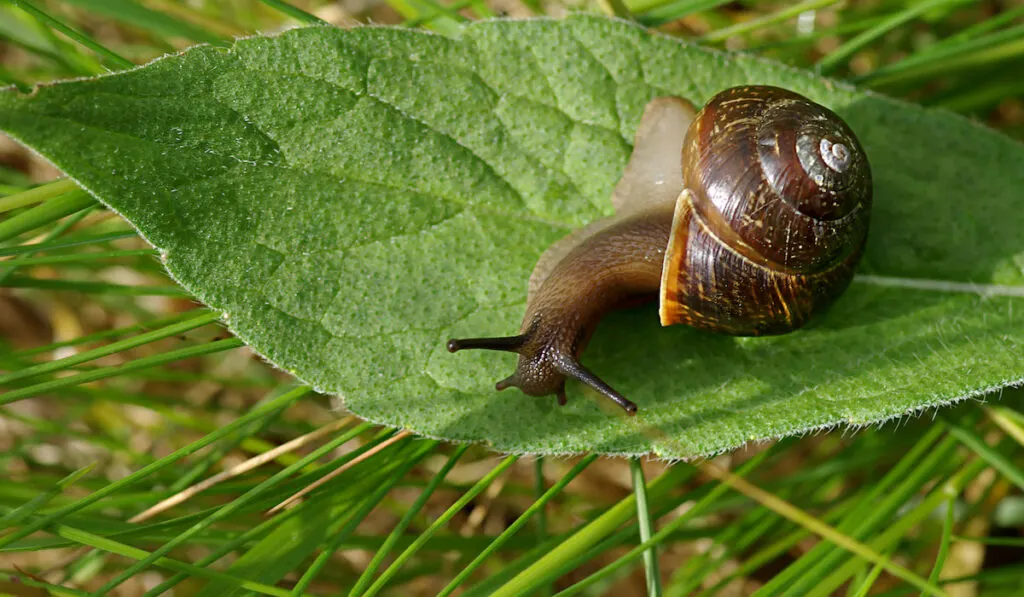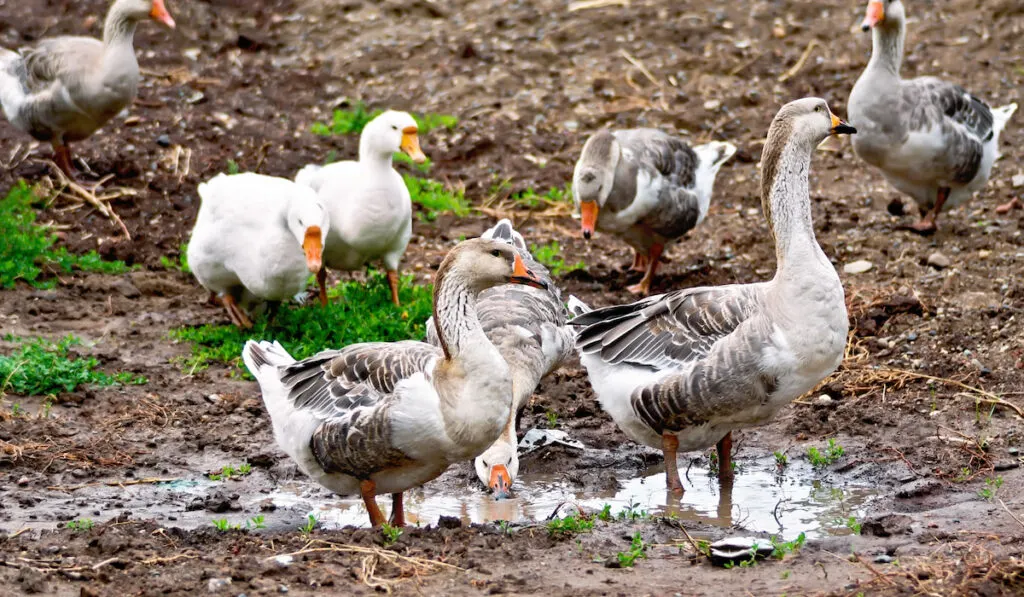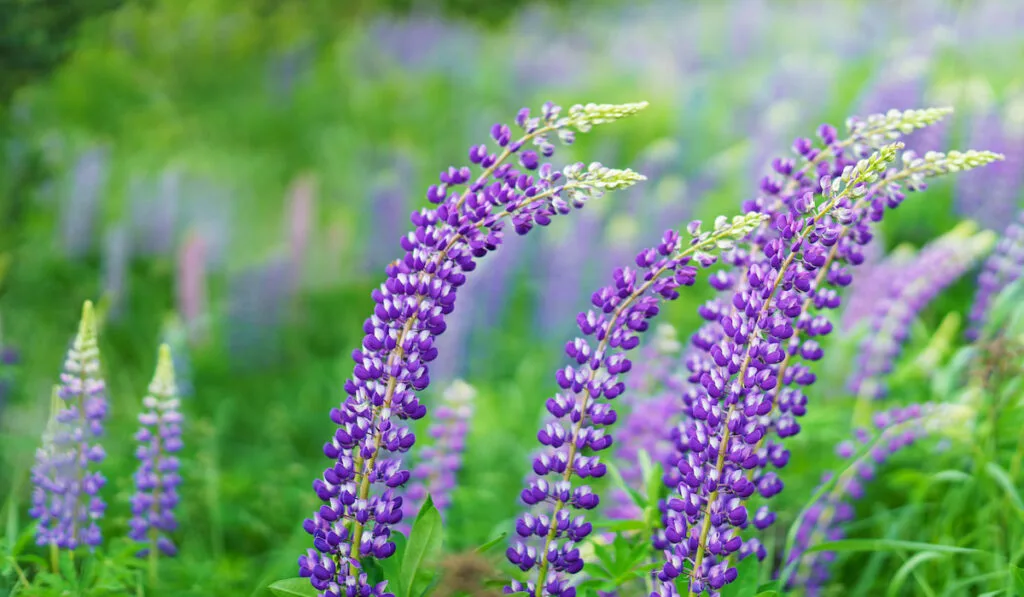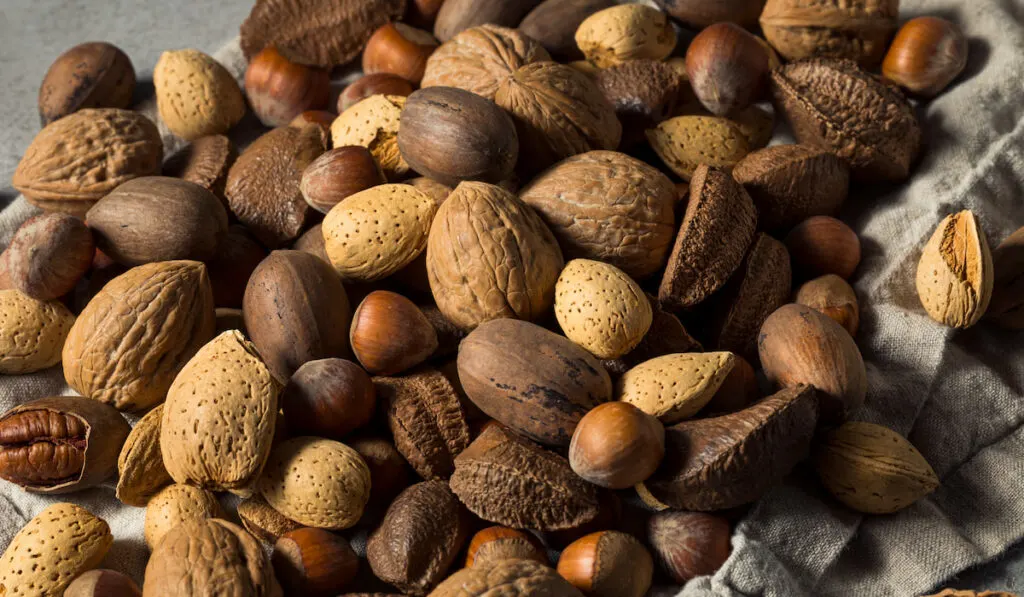Although geese prefer a plant-based diet of wheat, grass, or barley, they will eat animals such as slugs and snails.
Most of the time, consumption of slugs and snails is accidental if they are lingering on a goose’s main plant food source. Geese consuming slugs and snails is an added bonus to having them on a farm because they can help eliminate these pests.
In this article we’ll cover what nutrients slugs and snails might provide geese, the dangers of consuming them, what other foods geese consume, and things geese should avoid eating.

Table of Contents
What Nutrients Do Geese Get from Slugs and Snails?
Snails and slugs are actually full of nutrients that geese can benefit from including:
- Fat – helps boost body fat content for keeping warm in the winter
- Calcium – ensures strong egg shells for egg-laying geese
- Phosphorus – important for a healthy nervous system and strong egg shells for egg-laying geese
- Zinc – while an essential nutrient for overall health, if too much is consumed it can be harmful to geese
- Vitamins B6, K, B12, and A – especially important for neurological development and healthy blood clotting to prevent anemia
- Copper – while essential in small doses, copper can be toxic to geese if consumed in large quantities
- Magnesium – helps absorb calcium for strong bones and healthy egg shells
- Iron – supports healthy blood flow and prevents clotting issues that could lead to anemia
- Protein – supports muscle and feather growth and repair
Are Slugs and Snails Healthy for Geese?
Slugs and snails are healthy for geese in moderation. They can provide a lot of essential nutrients and minerals that geese will not get from just consuming a plant-based diet.
Most notably, protein and fat are two benefits that geese can naturally obtain from snails and slugs that they would otherwise have to receive from supplements.
Other minerals and vitamins such as magnesium, calcium, and phosphorus are important for egg-laying geese and can be found in the meat of snails and slugs.

What Are the Dangers of Geese Eating Slugs and Snails?
Typically, the consumption of snails and slugs is quite safe for geese. However, there is always the risk of these little invertebrates becoming a choking hazard, especially the snails with their hard outer shells.
Also, snails and slugs do contain zinc and copper which can be toxic to geese if they ingest too much. Given the size of the small creatures though, you would have to have an infestation of biblical proportions to be concerned about your geese overdosing on copper and zinc due to snail and slug consumption.
A more common issue would be the potential poisoning of geese from toxic chemicals applied to kill the slugs and snails. If geese ingest snails and slugs that have been affected by snail poison, they can become very sick and even die.
If you know that snail or slug poison has been applied to an area that your geese frequent and they are acting sick or sluggish, contact your veterinarian immediately.
What Are Some Other Things That Geese Eat?
Geese mostly eat grass, barley, or wheat and do well on a balanced diet even if fed pellet food. They are not vegetarians, however, and will consume other small insects and worms along with snails and slugs found in the grass.
Some geese have even been known to eat baby hamsters, mice, and rats if left unattended with the small rodents.
If left to free-range, geese will also eat clover, berries, seeds, and the roots of small grassy plants.
When feeding your geese, consider varying their diet from the normal barley or wheat with additional foods such as freeze-dried crickets, oats, cracked corn, chopped up grapes, vegetable peels, birdseed, or mealworms.

What Are Some Things Geese Should Avoid Eating?
There are plenty of plants that are toxic to geese so if you allow your geese to roam freely, you should be aware of the plants they can encounter and remove the ones that could make them sick. A few of these plants include:
- Monkshood or aconite
- Cottonseed or upland cotton
- Ragwort
- Oak (acorns)
- Yew
- Mountain laurel
- Cocklebur
- Lily of the valley
- Emerald feather or asparagus fern
- Johnson grass
- Cherry trees
- Foxglove
- Bellyache bush or wild cassava
- Christmas rose or black hellebore
- Lupine
- Crown vetch
- Water hemlock
- Fiddleneck
- Bracken fern
- Pokeberry
- Boxelder or ash leaf maple
- Giant hogweed or wild parsnip
- St. John’s wort
- Spring parsley
- Gooseberry
- Carolina jessamine, yellow jessamine, or evening trumpet vine
- Meadow saffron or autumn crocus
- Sweet pea
- Chokecherry
- Nightshade
- Azaleas
- Milkweed
While this list is not exhaustive, it does represent some commonly found garden or wild plants near or on farms.

In addition to wild plants, there are certain foods you should never feed your geese as they may have adverse effects and some can even be fatal. These include:
- Chocolate
- Mango peels
- Raw nuts
- Coffee or tea
- Alcohol
- Citrus fruits
- Spinach
- Avocados
- Uncooked dry beans
- Salt
- Rhubarb leaves
- Green tomatoes
- Green potatoes
- Onions
Contact your veterinarian immediately if you suspect that your geese have ingested any of these plants or foods.
Conclusion
While the diet of your geese mainly consists of grasses, they can and do eat some small animals including slugs and snails.
They may gain some much needed minerals and nutrients from consuming these small invertebrates, especially fats and protein they would not otherwise get from just eating plants.
Although there are some minerals in slugs and snails that can be toxic to geese in high doses, most likely your geese will not consume enough of these little critters for it to be a concern.
There are plenty of plants and foods that should be avoided, however, and you should always make sure that your geese can safely eat and digest something before feeding it to them.
In the event that you believe your geese have consumed something they shouldn’t or if they start acting strangely or sluggishly, call your veterinarian immediately.
